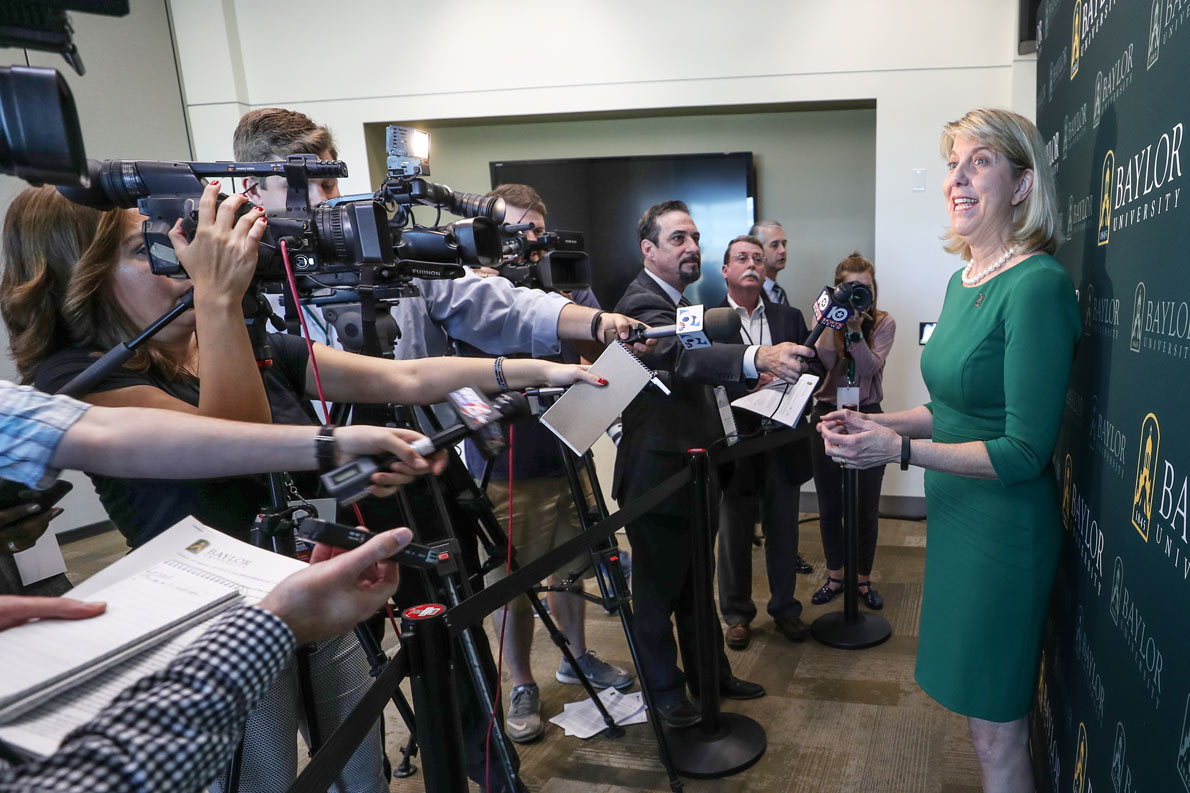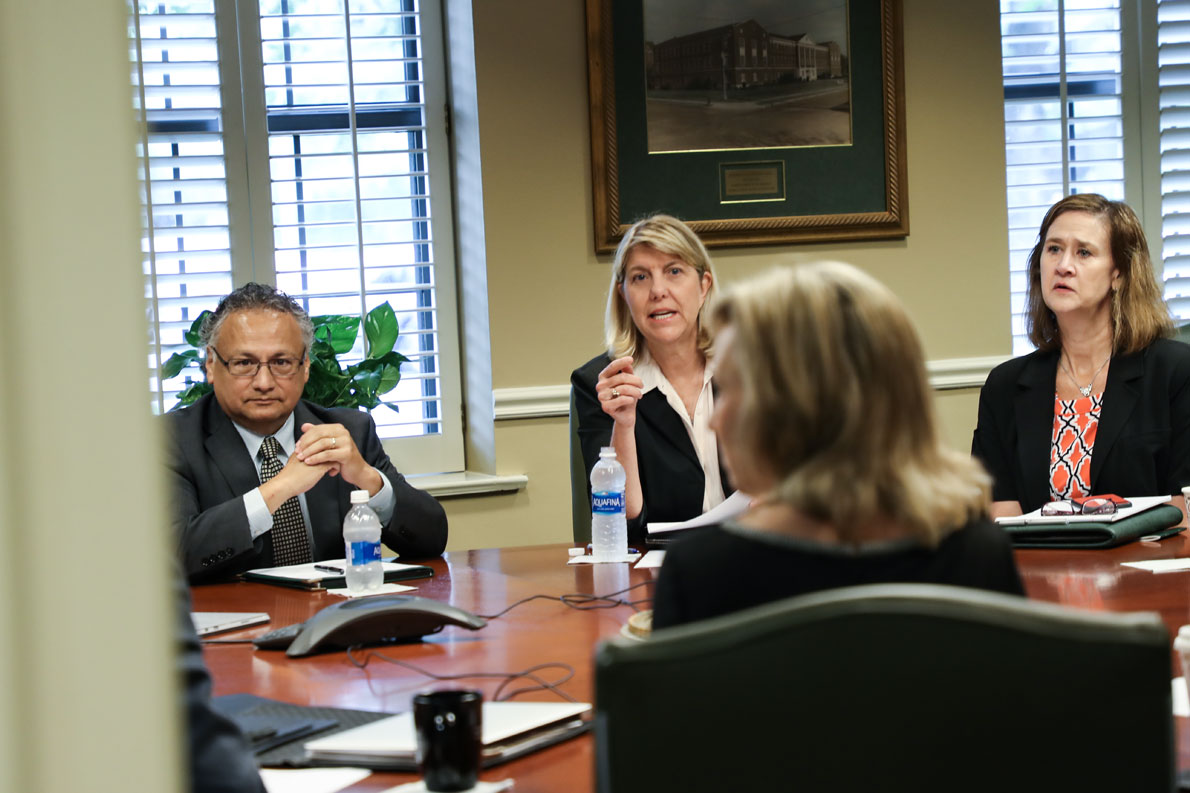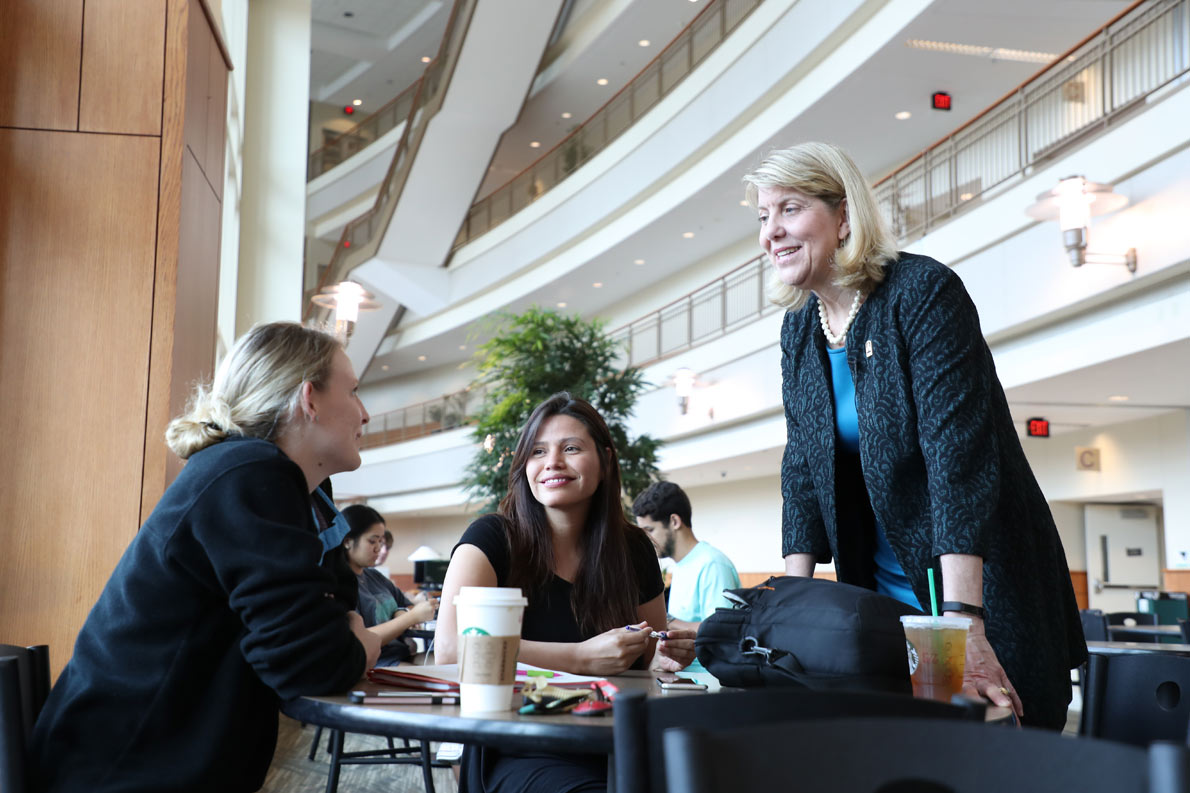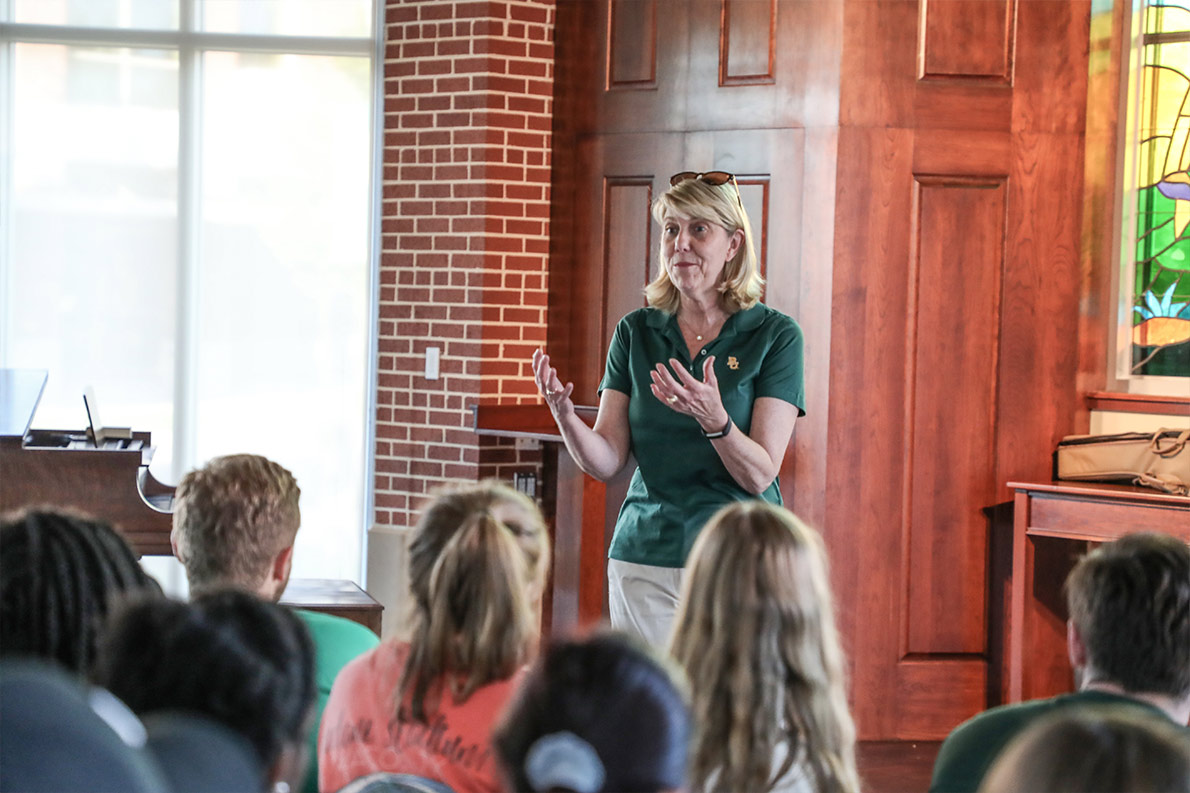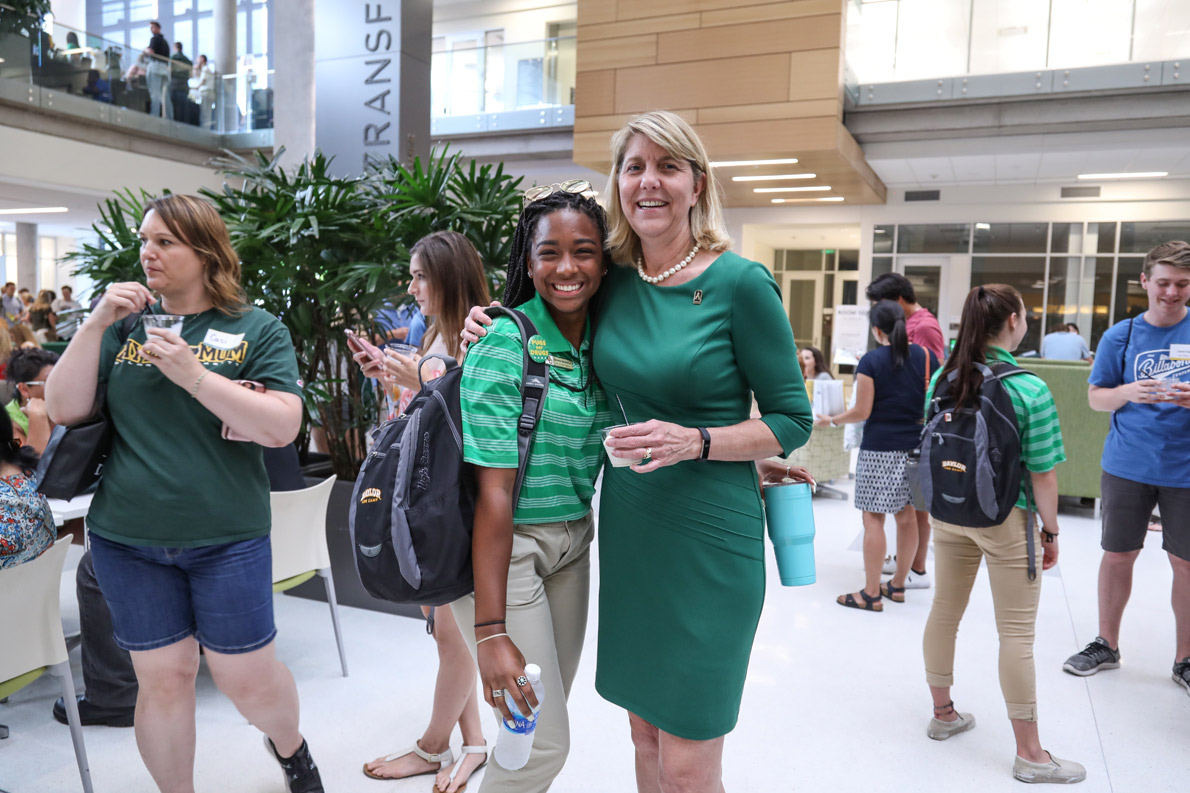Leading a Stronger, Committed University
Dr. Linda Livingstone returns to the university as its 15th president, prepared and ready to lead all facets of Baylor's mission-driven enterprise.
Linda A. Livingstone, PhD, did not always aspire to a career in upper-level university administration. Even as the possibility of that career path developed in recent years, she was determined to only look at institutions that aligned with her values.
Her discernment resulted in becoming Baylor’s selection as the university’s 15th president in mid-April. Livingstone officially took office June 1. It is a return for Livingstone, who was a Baylor faculty member for more than a decade in the Hankamer School of Business during the 1990s and early 2000s.
“When I got my PhD, it was really because I wanted to teach and do research,” Livingstone says. “When I came to Baylor and eventually became associate dean for graduate programs, I found being an administrator to be interesting.”
Livingstone left Baylor in 2002 for Pepperdine University, where she served as dean of the Graziadio School of Business and Management and professor of management. In 2014, she was named dean and professor of management for the George Washington (GW) University School of Business.
“Once I went to GW, I began to think about what I wanted to do with the rest of my career,” she says. “Several universities reached out to me about provost jobs and president jobs, but I was very happy at GW.”
Along came Baylor.
“Dr. Livingstone brings an accomplished academic career to Baylor, combined with a strong appreciation and support of Baylor’s mission,” then-chair of the Baylor Board of Regents Ronald D. Murff said upon Livingstone’s announcement as Baylor president. “A longtime Baptist and former Baylor faculty member, she has a passion for the distinctiveness of Baylor’s Christian mission in higher education.”
Livingstone says returning to Baylor was a perfect fit and opportunity on many levels.
“I know this place, and I know it at its core and its soul,” she says. “I understand the deeply held mission of the institution. And, because I’ve been here, I understand why people love Baylor so much and why they react so strongly to the good and difficult times that happen here.”
A Perkins, Oklahoma, native, Livingstone played varsity basketball at Oklahoma State University, where she earned a Bachelor of Science in economics and management, a Master of Business Administration and a Doctor of Philosophy in management and organizational behavior.
Oklahoma State is also where she met her husband Brad, who was a member of OSU’s men’s basketball team and a business management major. Their daughter Shelby, who was born in Waco, is a rising senior on Rice University’s volleyball team.
“We are very close family,” Livingstone says. “We have a lot of fun together, and we laugh a lot together as a family. We also pray together, and we worship together
as a family.”
"All humans are valued deeply, and we need to respect that and support individuals in interesting and unique ways at a Christian institution."
After completing her bachelor’s degree, Livingstone interned in the OSU athletic department for a year before spending three years with Kid’s Inc., a recreational activities program in Woodward, Oklahoma. In 1986, she accepted a position as an accountant at Enid (Oklahoma) Memorial Hospital.
Livingstone began her professional career in academia at Oklahoma State in 1987 as a graduate teaching assistant and research assistant in the management department. While working on her master’s degree, Livingstone also was student programs director for the OSU alumni association.
In 1991, Livingstone joined Baylor’s faculty as an assistant professor of management. Six years later, she earned tenure and became associate professor in that department. The following year, she was named associate dean of graduate programs.
Dr. Terry Maness, BA ’71, MS ’72, was Hankamer dean, the position he still holds, for roughly a year when he selected Livingstone for the associate dean’s position.
“As she served on the faculty, she was extremely well-liked by the students,” Maness says. “She’s one who listens well but also can make decisions.”
Maness says her appointment to associate dean came at a time when Hankamer was in the process of changing the MBA program, seeking more work experience and modifying the curriculum.
“She stepped into the middle of that and continued moving us in that trajectory,” Maness says. “She had a good scholarship record and maintained that, as well. She showed real leadership skills during her time here as associate dean. While I was sad to see her leave for Pepperdine, I was fully supportive of that because I could tell she was looking to take on more significant leadership roles.”
Her passion for leadership was evident prior to becoming associate dean as she served as vice chair of the Baylor Faculty Athletics Council in 1994-1995.
Livingstone says her time at Baylor was formative in the early days of her career, especially learning how to integrate faith with academics.
“One of our principles at a faith-based institution is the belief that all truth is God’s truth, and that truth is open to inquiry,” Livingstone says. “That gives you freedom as a scholar in a Christian institution to ask difficult questions, to investigate them and not be afraid of the answers you get.”
While at Pepperdine, Livingstone became heavily involved with the Association to Advance Collegiate Schools of Business (AACSB), for which she has been a board member since 2009 and an executive committee member since 2011. She served as AACSB vice chair during the 2013-2014 academic year and chair in 2014-2015.
A member of the National Association of Corporate Directors and Women Corporate Directors, Livingstone is a member of the board of directors for Capital Southwest Industrials. In 2005-2006, she served as program chair for the Western Association of Collegiate Schools of Business and was the organization’s president the following year.
In 2013, Livingstone was recognized as a Top 50 Distinguished MBA Alumni by the Oklahoma State Spears School of Business. Two years later, she was a Spears Hall of Fame Inductee and the inaugural recipient of the school’s Outstanding PhD Alumnus Award. Livingstone was one of six recipients of OSU’s Distinguished Alumni Award in 2015.
Additionally, Livingstone was recognized as one of 25 “Women Who Mean Business” by Washington Business Journal last fall.
Livingstone says becoming a dean gave her a broader perspective into the workings of a university, and she believes her experiences during 15 years as dean of a business school will make her more sensitive as president to understanding people throughout the institution.
“The decisions you make and the initiatives you undertake impact schools and faculty and deans,” she says. “There is an importance to engaging those people in
the process.”
Livingstone’s professional climb should come as no surprise. A 2014 ESPN and EY Women Athletes Business Network study showed that more than half of all female executives at Fortune 500 companies in five countries, including the United States, participated in collegiate athletics. She says the qualities that define successful student-athletes—hard work, commitment, discipline—also define successful business leaders.
“It’s not that other people can’t have those qualities, but it definitely prepares you,” she says. “You learn how to work in teams. You learn how to work under pressure, how to perform with people watching. That matters a lot when you get to higher levels in organizations.”
Livingstone recognizes that athletics is one of the most visible things at a university and calls it a window into the institution.
“But you must do it well and do it right,” she says. “What we do in athletics must support Baylor’s Christian and academic mission, not the other way around. We will focus on continuing to excel on the court and on the field, but doing it in a way that enhances and supports the core academic and Christian mission of the university.”
That mission is one of the main reasons Livingstone decided to return to Baylor. She says being a Christian institution provides a deeper foundation.
“It drives the decisions you make in the organization and informs the curriculum—the people you hire, the way you do business—in a way that is different than if you’re at a secular institution,” she says. “There is a deeper way of thinking about the formation of student life. We’re developing students intellectually, socially and physically, but we’re also helping them grow and develop spiritually.”
Livingstone says her personal Christian faith informs her decisions, the way she conducts her life and the way she leads.
“All humans are valued deeply, and we need to respect that and support individuals in interesting and unique ways at a Christian institution,” she says. “My faith will inform the leadership team I put together and how we conduct ourselves. The way we interact will be grounded in Christian principles. We will encourage and support one another while working through difficult issues. It will be our faith and our values that drive forward the university.”
Although she attended a public university, all of Livingstone’s professional experience in academics over the past two-plus decades has come at private universities, two of which were faith-based institutions. She sees common threads between Baylor, Pepperdine and George Washington.
“There is a service focus at each of those universities,” Livingstone says. “And there is embedded in all three of those universities a desire on the part of the university and the students to do something significant, something that matters, that makes a difference in the world.”
These resounding positive aspects of Baylor are sometimes overlooked by those not around the university on a regular basis. Recent events cast an even larger shadow. However, Livingstone knows Baylor is headed in the right direction, and she eagerly accepts the responsibility of guiding the university forward.
“Baylor is an exceptional academic institution,” she says. “We’ve made mistakes. We have learned from those difficult circumstances. Students coming here will have a safer, healthier environment. They will have a richer academic experience. They will connect with one another and with faculty in deeper ways than they would have before.
“We will be a stronger, better university.”
